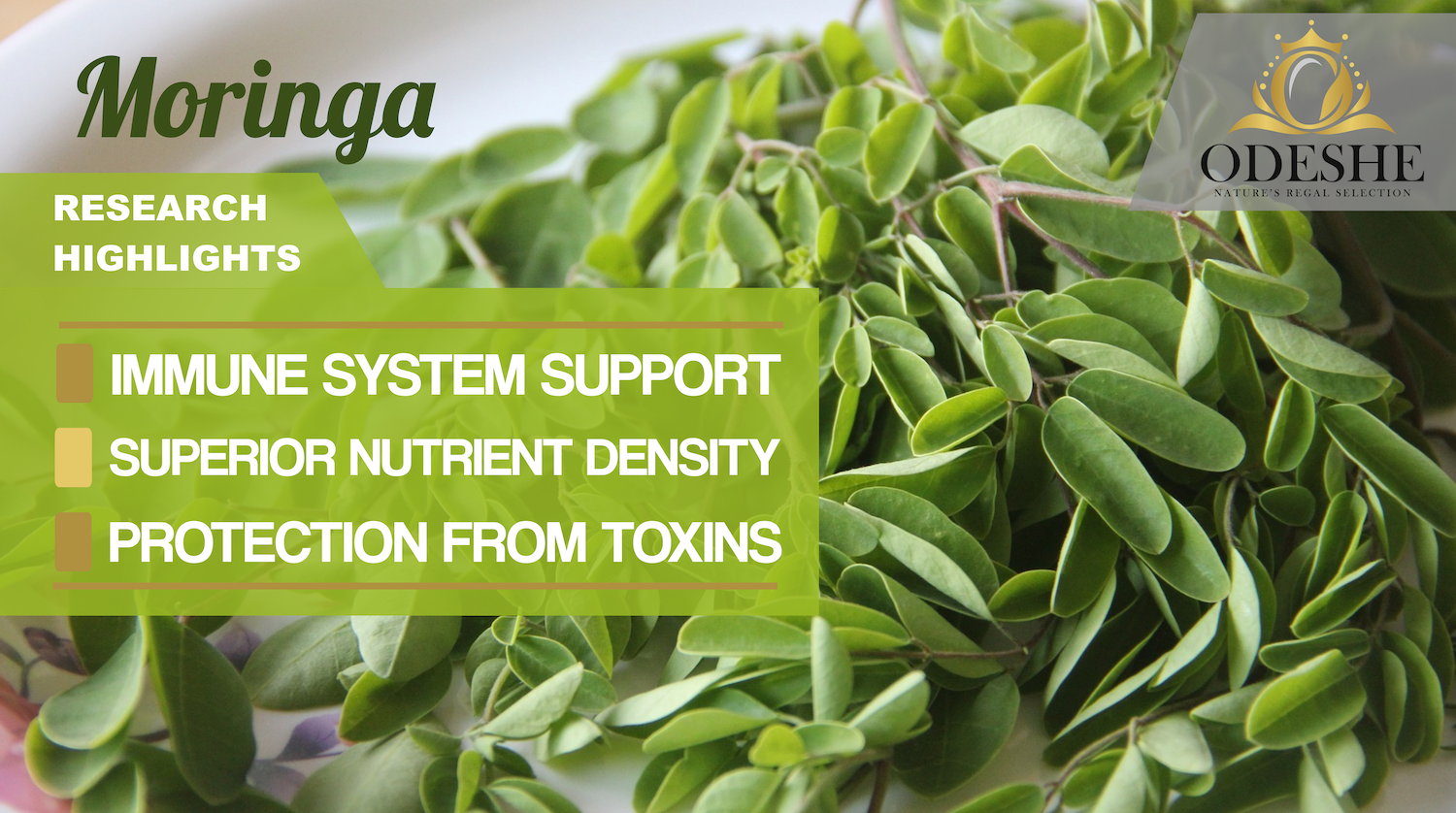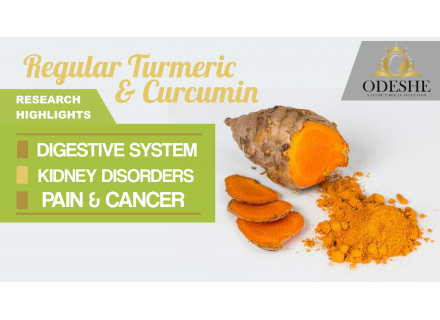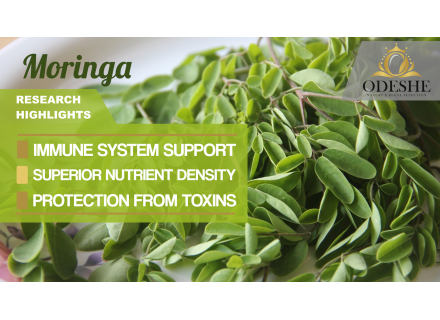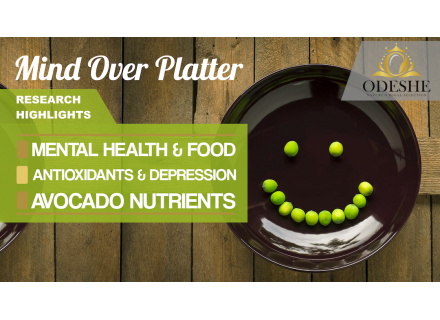Moringa: A Model Superfood

Every single part of the moringa plant has medicinal properties [1]. Moreover, moringa leaves provide “…7 times more vitamin C than oranges, 10 times more vitamin A than carrots, 17 times more calcium than milk, 9 times more protein than yoghurt, 15 times more potassium than bananas and 25 times more iron than spinach.” [2]. Clearly moringa is super amongst superfoods! There is so much scientific research on moringa’s positive impact on health that this article summarises different experiments and groups them according to health concern. But it must be emphasised that all the benefits compiled in this article don’t even scratch the surface of moringa’s scientifically detected nourishing abilities!
Herbal Profile
Health Uses Identified in Research | anaemia, diabetes, cancer, hypertension, chronic kidney disease, malnutrition, obesity, pregnancy, anaemia [3,4] |
Identified Nutrient Molecules | Vitamins A, B3 (nicotinic acid), B6 (pyridoxine), B9 (folic acid), C and E; calcium, iron, zinc, potassium, magnesium, protein, omega-3 fatty acids (linoleic, linolenic and oleic acids) [2] |
Dose(s) Used in Trials | 12–48 grams daily (immunostimulation) [5] | 1.4 grams daily (anaemia) [6] | 8 grams daily (blood sugar control) [7]; or 20 grams per meal [8] | 4–8 grams daily (cholesterol management) [7,9] |
May Work Well With | Astragalus, garlic, grape seed (immunostimulation) | Nettle (anaemia) | Garlic, milk thistle (blood sugar control) | Garlic, grape seed, milk thistle (cholesterol management) |
Plant Bioactive Molecules | stigmasterol, sitosterol, kampesterol, tannins, sterols, terpenoids, caffeic acid, flavonoids [2] (quercetin and epicatechin [10]), benzyl isothiocyanates, niazimicin A, B pterygospermin, and 4-benzyl glucosinolate [6] |
Form(s) Consumed | (Commonly consumed) Leaves, leaf powder, oil [2] |
Identified Toxins | None identified |
Boosting the Immune System, Mitigating Immune Disorders & Active Against Viral Infection
- Moringa directly inhibits the growth of many bacteria, fungi and viruses via several of its chemicals that attack microbes in diverse ways [4].
- Doses between 400–800 mg per kg of body weight increased white blood cell count, specifically increasing the numbers of the following immune cells “…lymphocytes, neutrophils, and monocytes…” [5].
- Moringa stimulates antibody production, increase in white blood cell production (specifically leukocytes) and neutrophil activity at a dose of 200 mg/kg (when tested on immunosuppressed animals) [11].
- Moringa’s ingredients also enhance several of the body’s own antioxidant enzymes, which make moringa effective against chronic inflammatory conditions such as ulcerative colitis [4].
- Moringa provided some alleviation to auto-immune diseases such as rheumatoid arthritis, dermatitis and hyperthyroidism [4].
- Although not empirical evidence, moringa has a positive reputation amongst HIV patients in African countries:
- “An ethnobotanical survey was conducted… on plants used in treatment of viral infections” [12], and the herb most frequently bought by HIV patients was moringa [12].
- Amongst HIV patients in Zimbabwe, 68% that joined a study stated that they consume moringa. Of those, 81% were also on antiretroviral drugs and 80% were taking moringa to boost their immune system [13].
- Multiple compounds naturally found in moringa (such as quercetin, caffeic acid and epicatechin) have even been identified by computer simulation for their potential to interfere with a “virus maturation” enzyme (i.e. metalloprotease) in SARS-CoV-2 [10], a property that could limit viral replication [14].
Research has detected Medicinal Properties in every single part of the Moringa plant (credit: dialloyaayaa)
Evidence of Moringa’s Anti-Cancer Benefits
- Moringa has many properties against isolated tumour cells including reduced proliferation (i.e. tumour cells multiplying) and increased production of anticancer defence chemicals (reactive oxygen species) [3].
- Concentrated extracts of moringa leaves were given to mice with melanoma tumours, and “… an oral administration of 500 mg/kg for 15 days of the extracts determined a delay in the growth of tumors and a significant increase of life span of 48% and 32%” by different moringa extract types [15].
Moringa Reversing Anaemia Issues
- Different extracts from moringa were tested directly on the haemoglobin protein drawn from sickle cell patients, and moringa extracts reduced haemoglobin protein aggregating by 88.8–95.8% [16].
- Amongst 35 anaemic women, 17 were given 1.4 g of moringa leaf extract per day for 21 days and improvements (compared to the control group) in haemoglobin levels and multiple other measures of blood iron and blood cell health were reported [6].
- In a similar study, 30 women were given 100 g daily of a blend made of 4 parts moringa : 1 part “jaggery” (an Indian cane sugar concentrate) for 30 days [17]. 77% of moringa consumers had an increase in haemoglobin after supplementation, compared to 80% of the 30 control group women who showed no improvement in haemoglobin.
- Mothers who delivered babies pre-term increased their volume of breast milk production within 5 days by consuming 250 mg of moringa leaves (compared to placebo group) [18]. Maternal stress was not elevated, however the strain of pre-term babies hospitalised may have resulted in lowered milk production due to limited blood flow. It is thought that the increase in breast milk production may be due to moringa’s ability to elevate levels of the blood serum protein “prolactin”, which is responsible for stimulating milk production.
Moringa Improving Blood Sugar Control
- Moringa’s capacity to help the body regulate blood sugar has been recognised in multiple experiments. Adding moringa leaves to a meal lowered the post-meal rise in blood sugar by 21% (compared to those who had the same meal with no moringa) [19].
- After a daily dose of 8 g for 40 days, diabetes patients had a greater than 25% reduction in both post-meal and fasting glucose levels (whilst the control group without moringa saw glucose levels remain steady) [7].
- Compounds found naturally in moringa (i.e. “isothiocyanates”) have been determined to suppress the liver’s enzymes responsible for producing more glucose [20].
- A survey of 220 diabetes patients in Senegal identified that over 60% were consuming Moringa [21].
- Over 60% also believe medicinal plants to be effective in diabetes treatment, although since 20% reported adverse effects (i.e. 41 had gastric disorders; 2 had hypoglycaemic symptoms (fatigue, orthostatic hypotension, vertigo) and 1 had a hyperglycaemic coma) that could be due to those medicinal plants. These complications, along with the fact that only 55% knew the appropriate dose to take, highlight the importance of professional consultation with natural interventions. [21].
- Only diabetics experienced a decrease of their post-meal increase in blood sugar by addition of 20 g of moringa to a single meal; healthy subjects experienced a decrease that was not significant [8].
- In a comparison of different studies, moringa was effective at multiple doses in lowering 1 or more indicators of blood sugar levels, and even when no effect was observed in 1 study this could be explained by study design [22].
Moringa Regulating Fat and Cholesterol Metabolism
- Amongst diabetic patients with irregularities in their fat metabolism, a daily dose of 4.4 grams of dehydrated moringa leaves managed to lower total cholesterol by 1.6% and lower HDL by 6.3% compared to the control group [9]. This lipid profile change, achieved after 50 days of supplementation, is thought to lower the risk of developing blood clots due to fatty deposits in the bloodstream.
- In another study, diabetic patients were given 8 g of moringa leaves daily for 40 days, and although there was no decrease in HDL, LDL and VLDL were lowered by 14% and 29% [7].
- Improving cholesterol management is supposed to improve immunity via the various forms in which cholesterol metabolites influence immune cell metabolism, and also cholesterol levels have been correlated with cancer cell progression (by influencing cancer cell metabolism) [23].
- Since fat and cholesterol metabolism can also influence diabetes progression [24], moringa may be able to have a multi-factorial influence on many health issues via effective influence on cholesterol management [3].
Moringa can protect the Liver and Kidneys from toxic Drugs damage (credit: analogicus)
Moringa Protecting against Toxicity and Moringa’s Safety
- Multiple studies indicate that moringa leaves and moringa extracts lower the amount of damage done to the liver and kidneys from toxic chemicals such as nickel, or even damaging drugs such as “…isoniazid, rifampicin, pyrazinamide, acetaminophen and gentamicin…” [3,4,5].
- A specific extract of moringa was even able to significantly repress the cellular toxicity of cobra venom in mice (by reversing suppression of Nrf2 and other inflammatory immune signalling molecules) [25] . Such mitigation of cobra venom by moringa extract resulted in reduced blood cell damage, reduced haemorrhaging and increased survival rate from cobra venom [25].
- Doses below 2 g of moringa per kg of body weight were deemed safe based on blood cell analysis and enzyme assays of rodents, as well as improved sperm production amongst male rodents [5].
Overall, there are a wealth of health-promoting benefits of taking moringa that have been identified by multiple observational health surveys and intervention studies. For a more extensive and scientifically detailed list of moringa’s nourishing properties, please refer to these review articles [2,3,4]. Moringa is not only versatile in the many ways it supports health, but it has commonly been incorporated in meals and alongside other herbs in preparations [2,18,21]. At the very least, moringa has a reputation of maintaining it’s benefits in combinations, and it is possible that it’s great properties are amplified by the action of any complimentary herbs it is in combination with.
by The Odeshe Team.
Disclaimer: If you have medical concerns, please consult your doctor before implementing the opinions in this article.
ODESHE Immune Blend, available at www.odeshe.com
References:
1. Daba, M. (2016) Miracle Tree: A Review on Multi-purposes of Moringa oleifera and Its Implication for Climate Change Mitigation. J Earth Sci Clim Change 7.
2. Gopalakrishnan, L., Doriya, K. and Kumar, D. S. (2016) Moringa oleifera: A review on nutritive importance and its medicinal application. Food Science and Human Wellness 5, 49–56.
3. Leone, A., Spada, A., Battezzati, A., Schiraldi, A., Aristil, J. and Bertoli, S. (2015) Cultivation, Genetic, Ethnopharmacology, Phytochemistry and Pharmacology of Moringa oleifera Leaves: An Overview. IJMS 16, 12791–12835.
4. Xiao, X., Wang, J., Meng, C., Liang, W., Wang, T., Zhou, B., Wang, Y., Luo, X., Gao, L. and Zhang, L. (2020) Moringa oleifera Lam and its Therapeutic Effects in Immune Disorders. Front. Pharmacol., Frontiers 11.
5. Mbikay, M. (2012) Therapeutic Potential of Moringa oleifera Leaves in Chronic Hyperglycemia and Dyslipidemia: A Review. Front. Pharmacol. 3.
6. Suzana, D., Suyatna, F. D., A, A., Andrajati, R., Sari, S. P. and Mun’im, A. (2017) Effect of Moringa oleifera Leaves Extract Against Hematology and Blood Biochemical Value of Patients with Iron Deficiency Anemia. JYP 9, s79–s84.
7. Kumari, D. J. Hypoglycaemic effect of Moringa oleifera and Azadirachta indica in type 2 diabetes mellitus 4.
8. Leone, A., Bertoli, S., Di Lello, S., Bassoli, A., Ravasenghi, S., Borgonovo, G., Forlani, F. and Battezzati, A. (2018) Effect of Moringa oleifera Leaf Powder on Postprandial Blood Glucose Response: In Vivo Study on Saharawi People Living in Refugee Camps. Nutrients, Multidisciplinary Digital Publishing Institute 10, 1494.
9. Nambiar, V. S., Guin, P., Parnami, S. and Daniel, M. Impact of antioxidants from drumstick leaves on the lipid profile of hyperlipidemics. Journal of Herbal Medicine 8.
10. Umar, H. I., Josiah, S. S., Saliu, T. P., Jimoh, T. O., Ajayi, A. and Danjuma, J. B. (2021) In-silico analysis of the inhibition of the SARS-CoV-2 main protease by some active compounds from selected African plants. J Taibah Univ Med Sci.
11. Banji, O. J. F. and Banji, D. (2012) Immunomodulatory effects of alcoholic and hydroalcoholic extracts of Moringa olifera Lam leaves. INDIAN J EXP BIOL 7.
12. Ohemu, T. L., Agunu, A., Olotu, P. N., Ajima, U., Dafam, D. G. and Azila, J. J. (2014) Ethnobotanical Survey of Medical Plants Used in the Traditional Treatment of Viral Infections in Jos, Plateau State, Nigeria, International Journal of Medicinal and Aromatic Plants (IJMAP).
13. Monera, T. G. and Maponga, C. C. (2012) Prevalence and Patterns of Moringa Oleifera use Among HIV Positive Patients in Zimbabwe: A Cross-Sectional Survey. J Public Health Africa 3.
14. Muin, M. B. A. Effects of moringa oleifera supplementation combined with resistance exercise on immune responses and bone turnover markers among young men 41.
15. Purwal, L., Pathak, A. K. and Jain, U. K. (2010) In vivo anticancer activity of the leaves and fruits of Moringa oleifera on mouse melanoma 11.
16. Nwaoguikpe, R. N., Ujowundu, C. O., Igwe, C. U. and Dike, P. N. (2015) The Effects of Moringa oleifera Leaves Extracts on Sickle Cell Hemoglobin. Journal of Scientific Research and Reports 123–132.
17. Subramanian, D. M. Efficacy of Moringa oleifera in treating iron deficiency anemia in women of reproductive age group 3, 6.
18. Estrella, M. C. P. and Taup, M. A. A double-blind, randomized controlled trial on the use of malunggay (Moringa oleifera) for augmentation of the volume of breastmilk among non-nursing mothers of preterm infants 4.
19. William, F., Lakshminarayanan, S. and Chegu, H. (1993) Effect of some Indian vegetables on the glucose and insulin response in diabetic subjects. International Journal of Food Sciences and Nutrition, Taylor & Francis 44, 191–195.
20. Waterman, C., Rojas-Silva, P., Tumer, T. B., Kuhn, P., Richard, A. J., Wicks, S., Stephens, J. M., Wang, Z., Mynatt, R., Cefalu, W., et al. (2015) Isothiocyanate-rich Moringa oleifera extract reduces weight gain, insulin resistance and hepatic gluconeogenesis in mice. Mol Nutr Food Res 59, 1013–1024.
21. Dièye, A. M., Sarr, A., Diop, S. N., Ndiaye, M., Sy, G. Y., Diarra, M., Rajraji/Gaffary, I., Ndiaye/Sy, A. and Faye, B. (2008) Medicinal plants and the treatment of diabetes in Senegal: survey with patients. Fundamental & Clinical Pharmacology 22, 211–216.
22. Nova, E., Redondo-Useros, N., Martínez-García, R. M., Gómez-Martínez, S., Díaz-Prieto, L. E. and Marcos, A. (2020) Potential of Moringa oleifera to Improve Glucose Control for the Prevention of Diabetes and Related Metabolic Alterations: A Systematic Review of Animal and Human Studies. Nutrients, Multidisciplinary Digital Publishing Institute 12, 2050.
23. Zhang, H., Zhao, W., Li, X. and He, Y. (2021) Cholesterol Metabolism as a Potential Therapeutic Target and a Prognostic Biomarker for Cancer Immunotherapy. OTT Volume 14, 3803–3812.
24. Lloyd-Jones, D. M., Hong, Y., Labarthe, D., Mozaffarian, D., Appel, L. J., Van Horn, L., Greenlund, K., Daniels, S., Nichol, G., Tomaselli, G. F., et al. (2010) Defining and Setting National Goals for Cardiovascular Health Promotion and Disease Reduction. Circulation, American Heart Association 121, 586–613.
25. Adeyi, A. O., Ajisebiola, B. S., Adeyi, O. E., Adekunle, O., Akande, O. B., James, A. S., Ajayi, B. O., Yusuf, P. O. and Idowu, B. A. (2021) Moringa oleifera leaf fractions attenuated Naje haje venom-induced cellular dysfunctions via modulation of Nrf2 and inflammatory signalling pathways in rats. Biochemistry and Biophysics Reports 25, 100890.


%203pp_FP200ML_perspective-200x200.png)


